Insights overview
Insights are dashboards that make it easy to visualize and interpret metrics that are captured by SEI. With a variety of out-of-the-box widgets, you can create Insights that show the data you care about most and help you understand your engineering team's effectiveness and efficiency.
This topic explains how to create and view Insights. For information about configuring specific reports and the metrics that are presented on widgets, go to Metrics and reports.
View Insights
The primary way to access Insights is through the Insights tab.
- Log in to the Harness Platform and go to the SEI module.
- Go the Project scope and select your project.
- Select the Insights tab on the navigation menu.
You will be automatically directed to the first Collection and the associated Insight. Note that for the existing logged-in users, SEI maintains the latest state and automatically redirects you to the most recently viewed Collection and Insight.
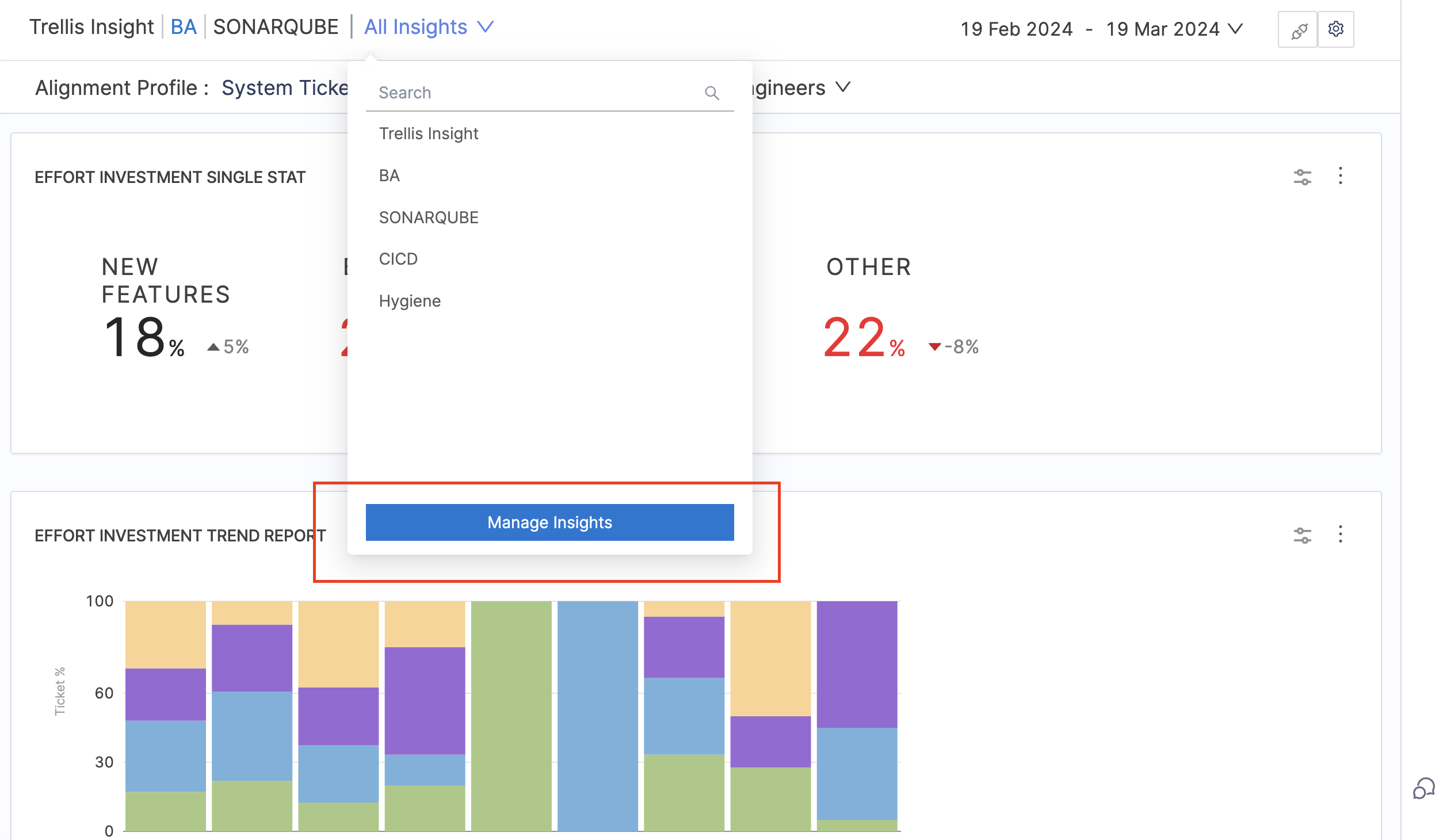
Select Manage Insights to view all the Insights. The Insights available for each Collection depend on the Insight associations. The Default label indicates the Collection's default Insight.
To switch projects or Collections, use the Project and Collection options on the navigation menu. You can also use the breadcrumbs in the Insights header to navigate up through the Collection hierarchy.
If integration monitoring is enabled, you can view the integration status in the Insights header.
Explore data
Once you're viewing an Insight, you can explore the widgets and interact with the data.
Widgets get data from integrations, which are inherited from the Collections associated with Insights. In turn, Collections inherit integrations from their associated Harness project, because integrations are configured at the project level. For more information about this hierarchy and configuring Collections, go to Collections.
You can also configure individual metrics and widgets to specify what data is used in calculations, how data is presented, and other criteria. For more information, go to Metrics and reports.
Set the Insight time
Insight time is the time range selected by the user viewing an Insight. Widgets and reports must be configured to Use Insight Time in order for their data to update when you change the Insight time range.
If a widget or report uses a specific time range, changing the Insight time has no impact on the data shown by that widget or report.
Drill down into data
Some widgets allow you to drill down into data. For example, you can select a segment of a bar on a bar chart to examine the data for that segment.

Access Insights from the Insights list
- While viewing an Insight, select All Insights in the header, and then select Manage Insights to go to the Insights list.
- Select the Insight you want to view from the Insights list.
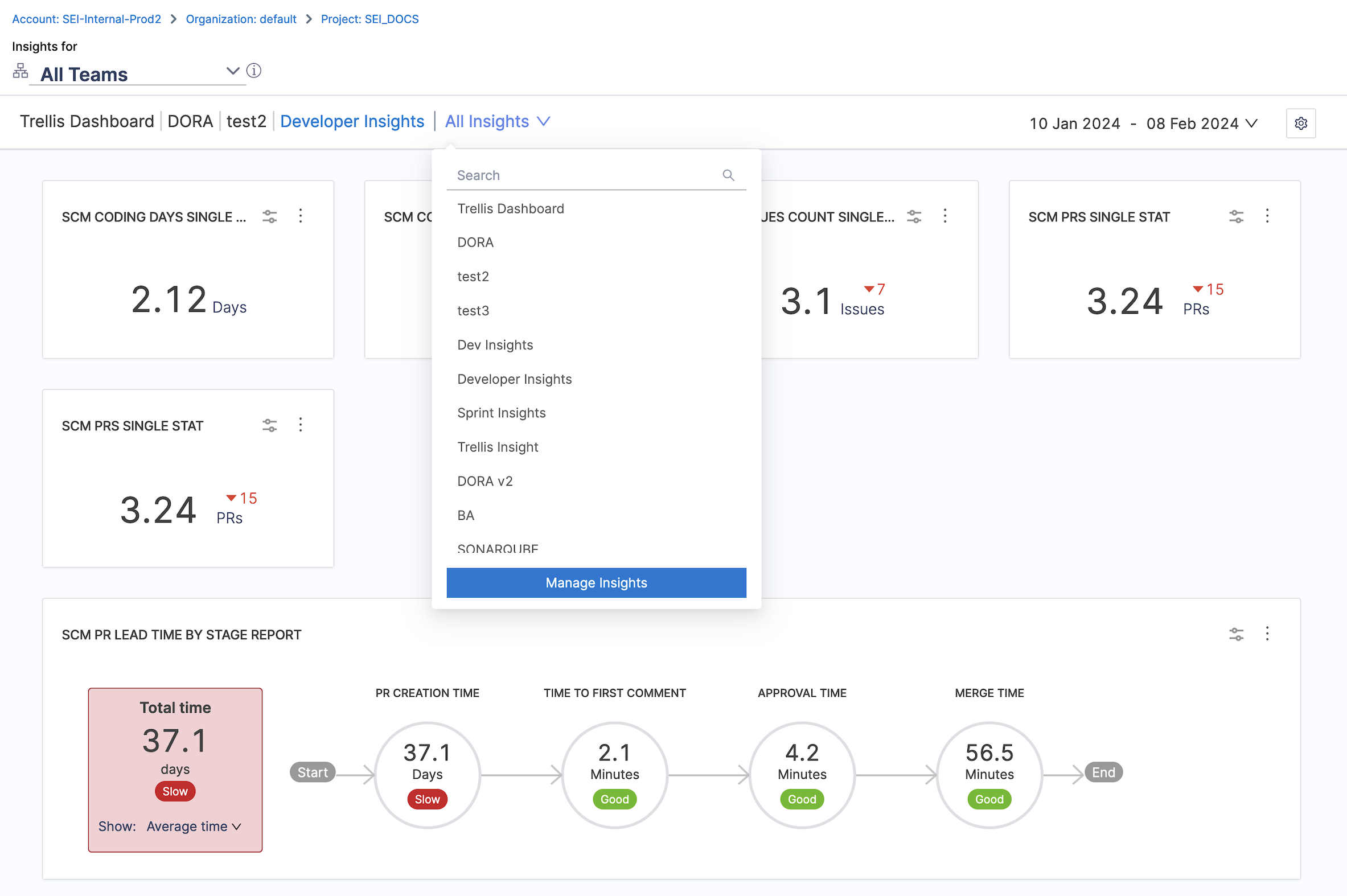
- You can change the Collection using the Collection navigation header at the top of the Insight.
- Select a Collection. Upon selecting a Collection, the current Insight opens up under the selected Collection heirarchy.
Create Insights
- Log in to the Harness Platform and go to the SEI module.
- Go the Project scope and select your Project.
- If you don't have any existing Insight, then click on the Create Insight button on the landing page to create a new Insight.
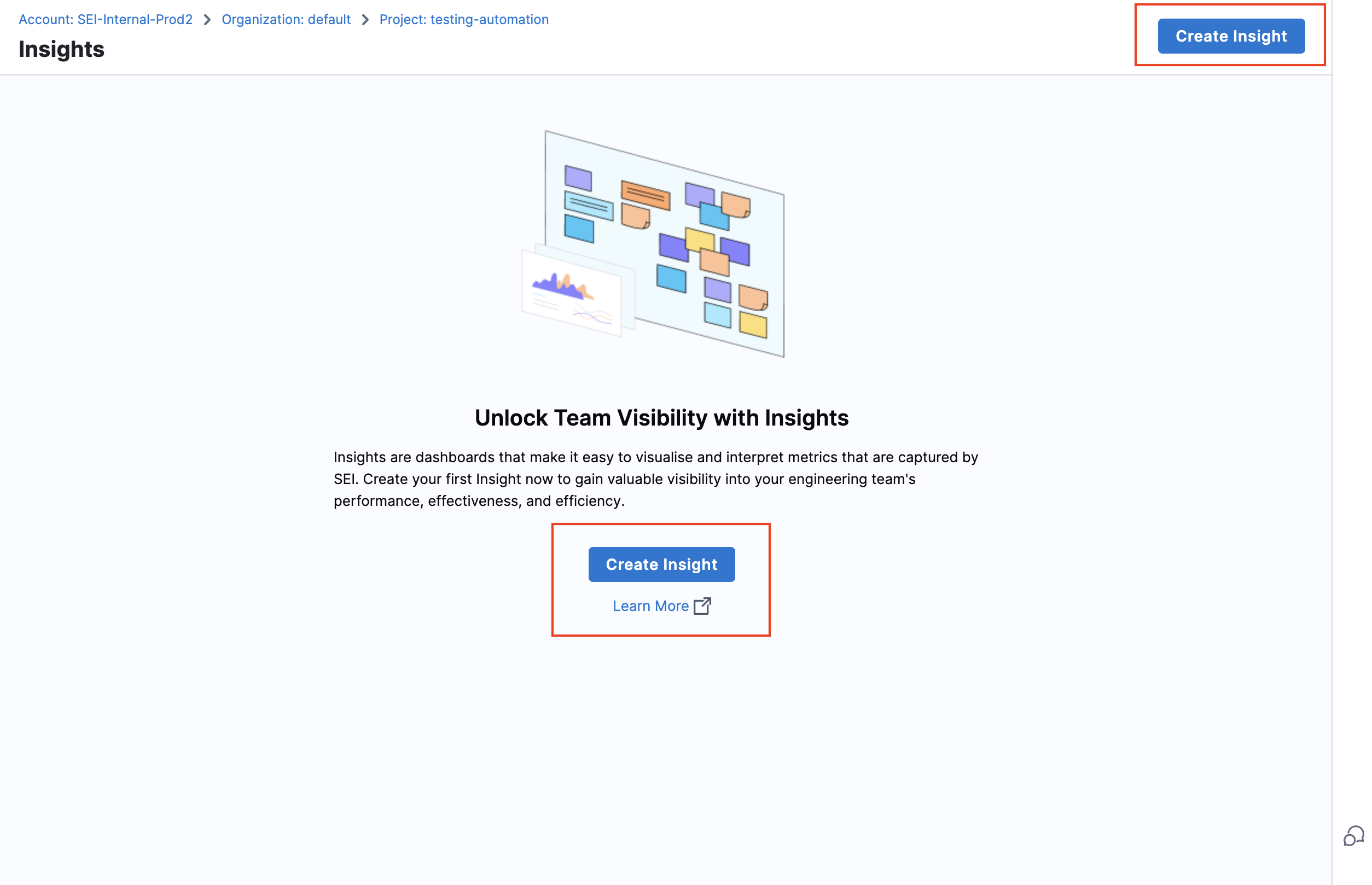
- If you already have existing Insights in your selected Project, then go to any Insight. For instructions, go to View Insights.
- In the header, select All Insights, and then select Manage Insights.
- Select Create Insight.
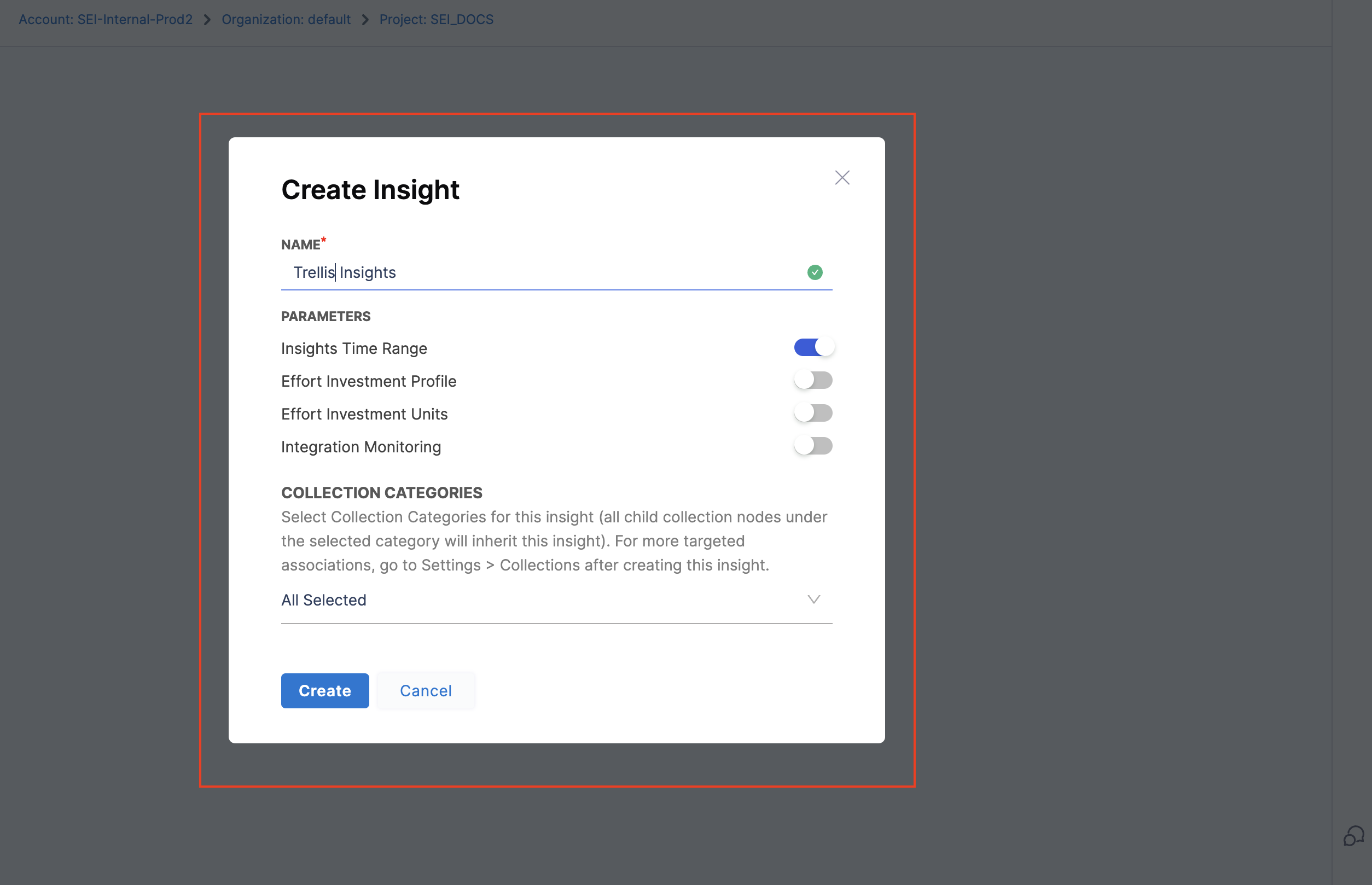
-
Enter a Name for the Insight.
-
Under Parameters, you can modify the following settings:
- Insight Time Range: You can enable Insight time, which is the time range selected by the user when viewing an Insight.
- Effort Investment Profile and Effort Investment Units are used for Business Alignment Insights and DORA Metrics Insights.
-
Select at least one Collection category to associate with this Insight.
All Collections and child Collections under the selected category are automatically associated with the Insight. You can refine the Insight associations after initial Insight creation.
If you want to examine Collections under a certain Collection category, select View Collections on the Collections Categories dropdown menu. -
Select Create to save the Insight metadata. From here, you can add reports or modify the Insight settings, such as Insights associations.
Add reports
Reports (also known as widgets) are the parts of your Insights that contain data. Reports can present a single statistic or they can present charts, graphs, and tables that compare or combine multiple statistics.
To add reports to Insights:
- Go to the Insight where you want to add the widget. Make sure you are in the correct project.
- Select Settings, and then select Add Widget.
- Select the widget that you want to add.
- Configure the widget settings. For information about configuring specific widgets go to Metrics and reports.
- Select Next: Place Widget and arrange the widget on the Insight.
- Select Save Layout.

Reports get data from integrations, which are inherited from the Collections associated with Insights. In turn, Collections inherit integrations from their associated Harness project, because integrations are configured at the project level. For more information about this hierarchy and configuring Collections, go to Collections.
You can also configure individual metrics and reports to specify what data is used in calculations, how data is presented, and other criteria. For more information, go to Metrics and reports.
Manage Insights associations
You can manage the Collections associated with Insights from the Edit Collection page, edit the Insights settings. For more information about this option, go to Managing Insights associations in Manage Collections.
Change the color scheme
You can change the colors for values on bar charts and pie charts. The color scheme applies to all Insights.
- In your Harness project, go to the SEI module.
- Select Account.
- Select Customize.
- Select the desired color for the highest and lowest values on bar charts and pie charts.
- Select Add Label to configure colors for other values.
- Select Save.
Visibility and sharing
Authentication, access, and user management are part of the Harness Platform. Permissions granted to users and user groups depends on their associations with resources and resource groups, which are controlled at the account and project level in Harness.
Harness SEI has three built-in user roles:
- SEI Admin
- SEI Collection Admin
- SEI Viewer
For more information about authentication, access, and user management, go to the following:
- RBAC in Harness SEI
- Manage Access Control for SEI Insights
- Harness Platform authentication (including 2FA and SSO)
- Harness RBAC overview
Popular Insights
The following five Insights are the most frequently used on SEI:
- DORA Metrics
- Dev Insights
- Business Alignment
- Trellis
- Planning Insights
DORA Metrics
Use the DORA Metrics Insight to examine your organization's DORA (DevOps Research Assessment) metrics.
If you want to create a DORA Metrics Insight refer to the below resoures.
Dev Insights
Dev Insights examines development efforts, particularly in relation to SCM metrics, such as PR creation, merging, and review collaboration.
For more information about SCM metrics and reports, go to velocity metrics and SCM reports.
If you want to create a Developer i.e. SCM Metrics Insight refer to the below resources.
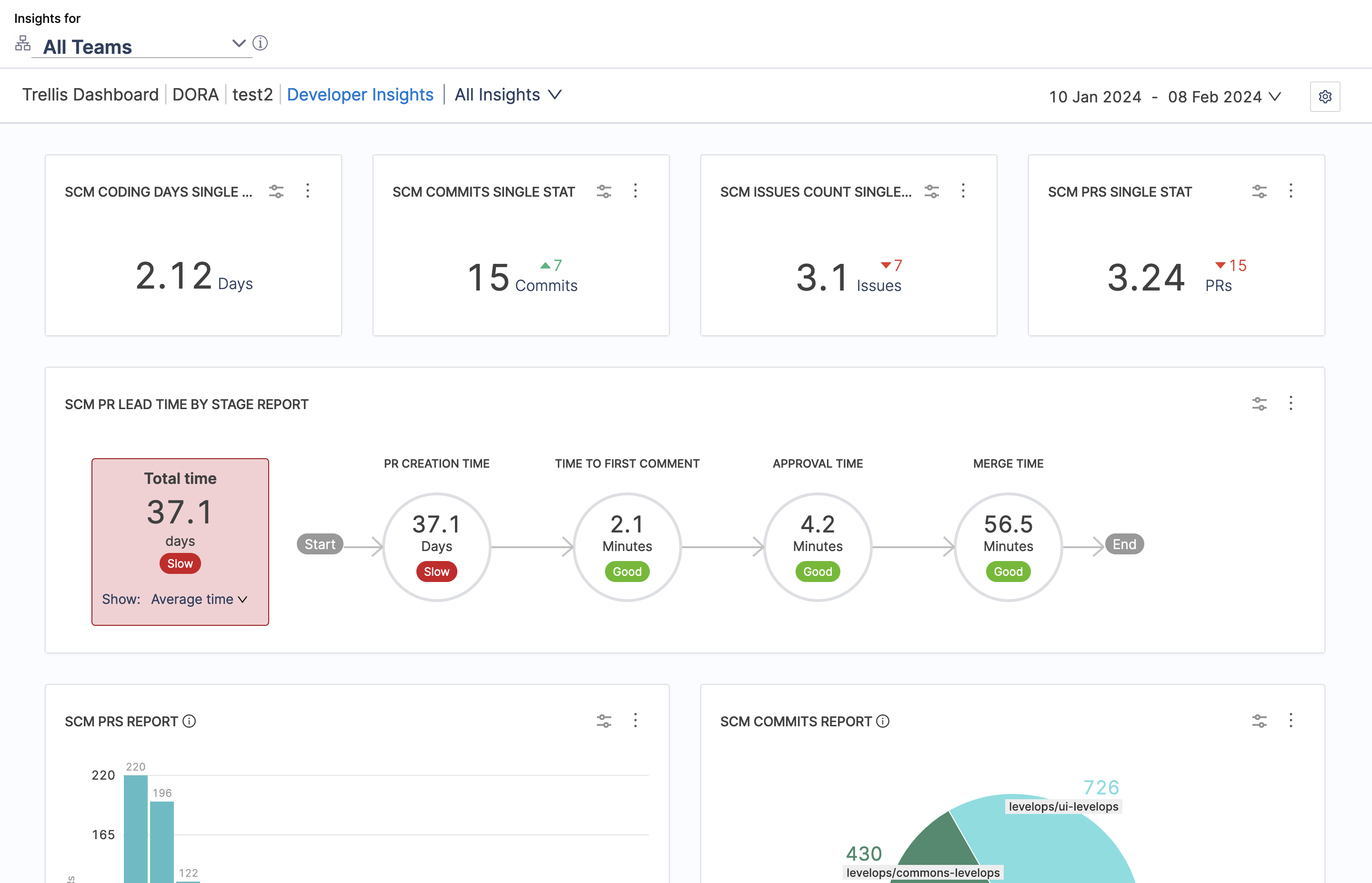
Business Alignment
The Business Alignment Insight can help visualize where your teams expend the most effort and help your teams prioritize their time. This Insight includes the following three widgets, which provide an overview of the categories or projects where engineers are allocating the most time:
- Effort Investment Single Stat
- Effort Investment Trend Report
- Effort Investment By Engineer
For more information about these reports and metrics, go to effort investment metrics.
If you want to create additional Business Alignment Insights, select the Effort Investment Profile option under Parameters when creating Insights.
Trellis
Use the Trellis Insight to examine Trellis Scores.
If you want to create a Trellis Insight refer to the below resources.
Planning Insights
Use the Planning Insight to examine sprint metrics.
If you want to create a Sprints Metrics Insight refer to the below resources.